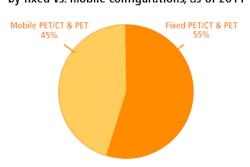Tuesday, November 29 | 11:50 a.m.-12:00 p.m. | SSG12-09 | Room S505AB
Choline-PET/CT can greatly affect therapy management for recurrent prostate cancer patients and should be considered for restaging, according to a new study by Swiss researchers.The research is a follow-up to an RSNA 2010 presentation co-authored by Dr. Jan Soyka from the Institute of Nuclear Medicine at University Hospital Zurich. Last year's study found therapeutic changes from the use of choline-PET/CT in 48% of prostate cancer patients. The current study, with the same patient population, evaluated which subgroup of patients had the highest benefit regarding therapeutic changes due to choline-PET/CT results.
The retrospective analysis included 163 patients with recurrent prostate cancer whose choline-PET/CT scans were performed for restaging. Questionnaires were sent to referring physicians 14 to 64 months after the scans to ask about the initial extent of prostate cancer and current curative and future treatment plans before and after choline-PET/CT.
The researchers also collected prostate-specific antigen (PSA) values from patient records before the scan, and they calculated Gleason scores to measure the severity of prostate cancer based on tissue sample results.
When PSA values and Gleason scores were evaluated together, the study group found a significant correlation between the Gleason score and the number of treatment plan changes in the group of patients with PSA values of 2 ng/mL or less.
In this population, Gleason score affected choline-PET/CT-induced treatment plan modifications in 28% of patients with Gleason scores of 6 or less, in 47% of patients with Gleason scores of 7 to 8, and in 71% of patients with Gleason scores of 9 to 10.
Patients with PSA relapse after initial treatment of prostate cancer should be examined with choline-PET/CT, Soyka and colleagues recommended.
"Despite the findings that choline-PET/CT is often negative, if PSA is below 2 ng/mL, an examination should still be discussed in these patients, especially if the Gleason score was 7 or higher because of the high therapeutic impact on treatment plans in the case of positive findings," he said.




















